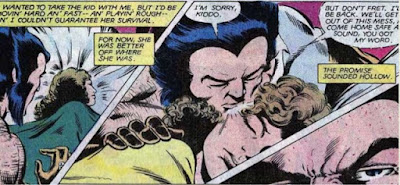Setting Rule: Hindrance Trading
 |
| Wolverine is the poster child for Hindrance Trading |
As mentioned many times before, the vast majority of my actual RPG playing time is spent playing duet (AKA solo or one-to-one) Savage Worlds games with my wife, Robin. Most of these short campaigns are romance stories in one form or another; the current one is a Victorian paranormal romance, while I’m looking toward prepping an anime-style sci-fi (reverse) harem rom-com.
The essence of romance – and especially romantic comedy – is self-improvement. The plot of almost any rom-com can be boiled down to “person with Hindrances meets another person with Hindrances, they work them out, and everything ends happily.” While these Hindrances can be external – debt, idiot sisters, parents exiled from their rightful kingdoms, etc. – the most common and most important Hindrances are internal – prejudice, pride, unhealthy obsessions, etc. Conquering these Hindrances drives the plot.
Several years back, I wrote extensively about Savage Worlds romance gaming in the context of Regency romances. Back then, I suggested that the way to emulate romantic comedy self-improvement was to allow players to buy off Hindrances, similar to how Habit [Major] can be bought off.
Many of my peers argued that this robbed players of a way of earning Bennies; while I’m still not sure that I agree with that argument (Savage Worlds Deluxe still seems to me to downplay roleplaying Hindrances in favor of clever ideas and advancing the plot) I will certainly admit that spending Advances on buying off Hindrances robs characters of mechanical growth (and optional ways of adding pseudo-Advances to let players buy off Hindrances without spending real Advances just overcomplicate things).
I’d therefore like to propose an alternative (that I’m sure many people already use as a house rule). While I conceived of it primarily in the context of romance gaming, it can equally apply to any genre predicated on personality growth, from military action (the Yellow new recruit whose burgeoning courage makes them Heroic) to superheroics (the Mean berserker who learns to be Loyal to their found family).
Hindrance Trading
Most genres emulated in roleplaying games assume that characters will not only grow in skill and power (the accumulation of higher Trait dice and Edges) but will also experience personal growth (the maturation of worldviews, the correction of personality flaws). This may be positive growth (Samwise Gamgee abandoning his provincial prejudices for cosmopolitan tolerance) or negative growth (any number of Lovecraftian protagonists descending into madness). Hindrance Trading allows for this development while keeping the dramatic possibility of Hindrances on the character sheet.
At the end of any game session in which a hero has experienced a personal milestone (or at the beginning of the game session after), the player may opt to trade one Major or up to two Minor Hindrances for a new Hindrance or Hindrances of equal value that reflect the character’s new outlook on life. Unlike at character creation, a hero may come out of a Hindrance Trade with two Major Hindrances.
Example: Rossletha the Barbarian began the campaign as Illiterate, a Minor Hindrance. Incapacitated during a battle with the yeti of the Heaven-Piercing Mountaing, she is taken in by the monks of Yama-hiten. Trey, Rossletha’s player, decides that during the long Natural Healing process, Rossletha takes an interest in the teachings of the monks. At the beginning of the game session after Arnam finally fully heals, Trey trades the barbarian’s Illiterate Hindrance for a Quirk; Rossletha has not only learned to read, she always has her nose buried in a book when not in combat!
Example: When Major Durning first began exploring the mysteries of the Necronomicon with his scholarly allies, he was brash and Overconfident (a Major Hindrance). Despite consistently passing Fear tests, Alice – Major Durning’s player – decides throwing some new complications into the game would be fun. After losing yet another comrade to the Great Race of Yith, Alice decides Durning’s after-dinner glass of port has become a whole bottle – and he’s carrying a flask of whiskey on his person at all times. She trades Overconfident for the Major Hindrance version of Habit, setting up a situation where she’ll have to buy off or trade away the new Hindrance further down the line.
Example: Jane is playing Elizabeth, a smart but sarcastic and judgmental young woman (a Minor Habit) who is also very good at holding grudges (the Minor version of Vengeful). Elizabeth meets the vexing Fitzwilliam, a handsome fellow with similar flaws. After numerous misadventures, Jane decides Elizabeth has recognized that her pride and prejudice have led her into terrible misjudgments. After declaring her love for Fitzwilliam, Jane swaps Habit [Minor] and Vengeful [Minor] for Heroic [Major] as Elizabeth embraces a newfound selflessness and courage.
Comments
Post a Comment